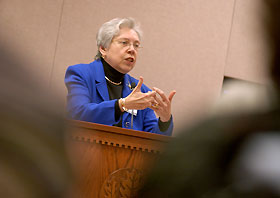Conference Highlights Benefits
Of Undergraduate Research
 |
|
Judith Ramaley of the National Science Foundation gives the keynote speech at a conference on undergraduate research Jan. 13. |
|
Photo by Peter Morenus
|
The ‘brain drain’ – graduates leaving Connecticut once they finish school – is over, thanks in part to the UConn 2000 and 21st Century UConn programs, participants at a recent conference on undergraduate education were told. The event was sponsored by the Honors Program.
“We’re in a ‘brain gain’ mode,” said Fred Maryanski, interim provost and executive vice president for academic affairs. “We’re keeping the best students here.”
But bringing in high-achieving students, he told the audience, “has put pressure on the faculty. These students very rightly demand more from you and also have the capacity of giving more. It’s a challenge.”
More than 100 faculty members gathered in the Rome Ballroom Jan. 13 for the conference, titled “Undergraduate Research and Scholarship: Fostering Engagement and Creativity.” It was co-sponsored by the Office of the Vice Provost for Research and Dean of the Graduate School and the University Libraries.
“This conference is critical as another important step in the mission of the Honors Program that will continue to transform and to raise its level to become among the best in the country,” said Maryanski.
Janet Greger, vice provost for research and graduate education, said engaging students in undergraduate research stimulates their interest in attending graduate school.
She stressed the importance of interesting women and minorities in science and education early in their careers. Involving them in research at the undergraduate level “is one of the best ways to guarantee that in the future, we have more diversity in the sciences and engineering,” she said.
Lynne Goodstein, associate vice provost and director of the Honors Program, said that for many undergraduates, research “is the most significant academic experience of their undergraduate careers.” They benefit from the mentorship of faculty and being involved as part of a team of researchers, and they experience the intellectual excitement that comes with discovering knowledge, she said.
Judith Ramaley, assistant director of the education and human resources directorate at the National Science Foundation and former president of Portland State University in Oregon and the University of Vermont, gave the keynote address, “Integrating Research and Education: Enriching the Undergraduate Experience.”
She asked: “How can we introduce our students to more sophisticated thinking? What should we expect of a college graduate, and what role can research experiences play in educating our students? What is it going to mean to be a successful member of the work force and as a citizen in societies that are shaped increasingly by technology and cyberspace? How does a research mindset, or deep curiosity about the world, play into a portrait of an educated person?”
Ramaley said engaging students in research-based education makes “the life of the mind real.”
She said there is “deep value” in using cyberspace, in addition to face-to-face interactions: In cyberspace, “you can actually watch someone’s thoughts unfold, if you take the time to examine what they say, how they say it, who reacts to that, and how the conversation unfolds.”
A key attribute of an educated person is an ongoing love of learning and a curiosity about the world, Ramaley said, noting that research helps develop those qualities through relationships with faculty and taking on new responsibilities. Research experiences also help students develop critical thinking skills, and provide a model for judging the validity of assertions.
“We have to open up our own minds to the interactions with our students so that they discover not just what we have discovered, or what we’re reporting others have discovered, but how that discovery occurs,” she said, adding: Let students know that “you do not know everything.”
The conference panels included, Involving Undergraduates in Research: What are the Benefits to Faculty? Research as a Tool for Retention, Mentoring, and Community Building; Ethics in Undergraduate Research; Strategies for Gaining the Resources and Funds for Undergraduate Research; The Honors Student and the Thesis; and Bringing Research and Creative Activity into the Classroom.
Michelle Williams, associate professor of psychology, was the featured speaker in the afternoon. The title of her talk was “Engaging Students of Color in Research: The Minority Advancement Program in Psychology.”
Jennifer Felsted, an honors student who will graduate this year with dual degrees in physiology and neurobiology and in psychology, said working on research with psychology professor John Salamone, helped her decide on a career in medicine.
“I evolved during the mentorship and discovered many things about myself,” Felsted said. Through working on research involving neuropharmacology and Parkinson’s disease, she realized she was “more science-oriented” than she had thought.

